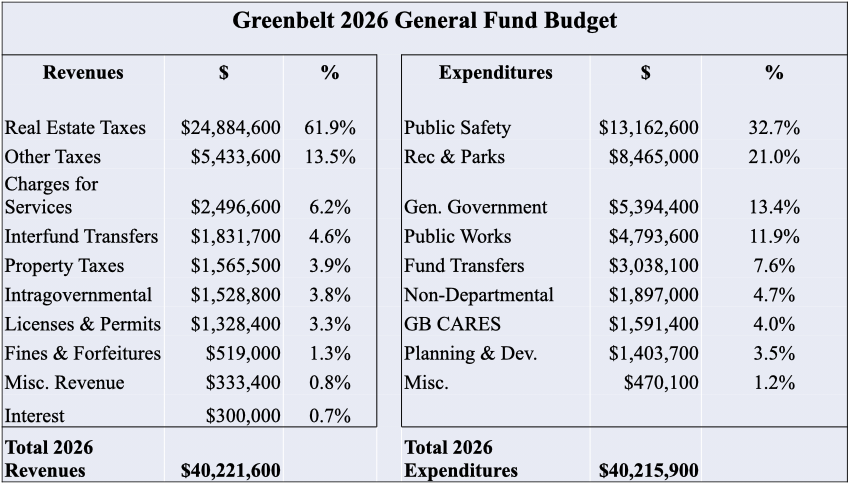At a worksession on July 27 and a special meeting on August 3, the Greenbelt City Council had an opportunity to meet with First Vice President Jennifer Diercksen and Senior Vice President Joe Mason from Davenport and Company (the city’s financial advisor) and City Bond Counsel Fabian Walters, from Miles and Stockbridge, to review bank bids and legislation regarding the refinancing of two of the city’s existing bond debts. Davenport, which handled the bids, was keen to take advantage of historically low interest rates, allowing the city to potentially save over $700,000. Walters prepared two pieces of legislation for council approval that would allow the city to do this refinancing. All of this effort stemmed from the June 22 meeting where council approved issuance of a Request for Proposal on these two debts.
The first was a bond fund debt from 2001 that was refinanced in 2011. There remains $1,771,996 outstanding with a present interest rate of 2.93 percent; it currently has six years left until final payoff. The second is a Taxable General Obligation Pension Refunding Bond from 2013, originating as an unfunded liability for the Maryland State Retirement and Pension System. This debt totals $2,282,641 at an interest rate of 5.30 percent; it has 13 years remaining until payoff. The payoff schedule for both bonds would not change with a refinancing.
Diercksen, in a separate interview, said that the savings bids came in two options: uniform, which means that the projected debt service savings is spread out evenly throughout maturity, and upfront, which means that the majority of the savings is taken in the first few years.
In regard to the 2011 bond, the best bid of the six received came from Freedom Bank. The bank offered a 0.85 percent interest rate, along with a flexible prepayment option, which would mean the bond could be callable, or paid at any stage, without a penalty fee. This low rate makes it unlikely that the bond could be refunded at a lower rate, but the prepayment option is still a plus. The uniform savings choice would mean a net budgetary savings of $81,213 and the upfront would be $79,140.
JP Morgan Chase (JPMC) offered the best of five bids for the 2013 bond. Their offer included a non-callable rate for both the uniform and upfront option (1.313 percent and 1.322 percent, respectively), and a callable rate for the upfront (1.47 percent). For the non-callable, $656,850 would be the uniform savings, and $610,484 for the upfront; the callable upfront savings would be $584,073. These rates are not fixed, and require acceptance after a 24-hour period; the rates would be refreshed after that time. Diercksen and Mason, along with council, felt that it was unlikely the rates would change in any substantial way in the next couple of weeks.
Freedom Bank also made a bid on the 2013 bond, offering 1.4 percent on uniform with a $643,371 savings, and 1.5 percent on upfront with a $578,780 savings. These rates are fixed and not subject to change, thus making it an attractive offer if council chose to work solely with them on both bonds.
After the July 27 meeting, both institutions lowered their rates; Freedom Bank by 2 points and JPMC by 10 points.
In response to a question on July 27 from Councilmember Rodney Roberts, Davenport provided council with a report from JPMC as to their environmental stance. The 2019 report stated that the bank recognizes the import of global climate change and is looking to “finance sustainability,” and looks to make diversity and inclusion a priority. It has an “ongoing focus on environmental, social and governance matters” and seeks “to do even more to take care of our clients, customers, employees and communities in this difficult time.”
Diercksen pointed out that the city was in a strong cash position, and stated that the choice between the uniform and upfront options would come down to a preference for council, based on projected budgetary pressures, such as the current pandemic situation.
Council decided to do a first reading of the A ordinance, prepared by Walters, which authorized and empowered the city to issue the bonds. It allowed for the amount of $4,125,000 to be borrowed “from time to time” for the “public purpose of refunding outstanding principal amount” of the 2011 and 2013 bonds. The 19-207 Local Government Article of the Annotated Code of Maryland was cited which, said Walters in a separate interview, “is beneficial to the city because it allows the city to refund its prior debt and take advantage of the current historically low rates” as well as Section 55 of the City Charter, which provided for the “levy of taxes sufficient for prompt payment of the maturing principal and interest” of the bonds, “generally relating to the issuance, sale and payment” of the bonds.
Council decided that ordinance B would be addressed on August 10 as it required choosing a bank, something that council wished to deliberate on for the time being, along with the introduction of these new rates. This ordinance and any final decisions on this matter will be discussed in a future article.
Mayor Colin Byrd and Councilmember Emmett Jordan expressed an initial preference for using Freedom Bank, with Councilmember Judith Davis saying that the city would likely “do better with one bank in the long run.”



